Earlier this year, a controversy spawned on Asian Twitter about some tweets that the celebrated Asian American novelist Celeste Ng had made a couple of years ago. In those tweets, she said that she wasn’t attracted to Asian men because they reminded her of her cousins. To her credit, Ng expressed regret and affirmed the need to have a dialogue on this all-too-common sentiment among some Asian Americans.
Unfortunately, there was a predictable and sustained backlash against her, mostly from Asian men but also Asian women. To them, Ng became the latest symbol of the Racist WMAF (White Male, Asian Female): an Asian American woman who exalts white men over Asian men (and all other men of color) using racist justifications. This issue resurfaced in an all-out Twitter war in late August after Ng publicized an email she received from a “Brandon Ho,” in which an apparent Asian man accused of her raising the next Elliot Rodger. Ng led the effort to shed light on toxic Asian American men who wanted to control Asian women.
Clearly, any such attacks, especially those on people’s families, should be condemned and there are indeed Asian male harassers whose activities need to be called out and curtailed. That is a non-negotiable point. We at Plan A hate these cowards who have no ability to express themselves except by emotionally rage-jerking off from behind the safety of their keyboards. Fuck them.
But there is much more to this issue than just a horde of angry and misogynistic Yellow Men whose backwardness and sexual frustration fit in so neatly (and to some, delightfully) with old racist preconceptions. The complexity of all this can be seen in Ng’s own missteps during the August incident, in which she allied herself with a Twitter user named Louis Leung, an actual misogynist that we at Plan A had long warned people against. Not only that, but she also endorsed a user, @AntiBullyArcee, who turned out to be Leung’s sock puppet account that he used to spew homophobic and sexist remarks against his online enemies.
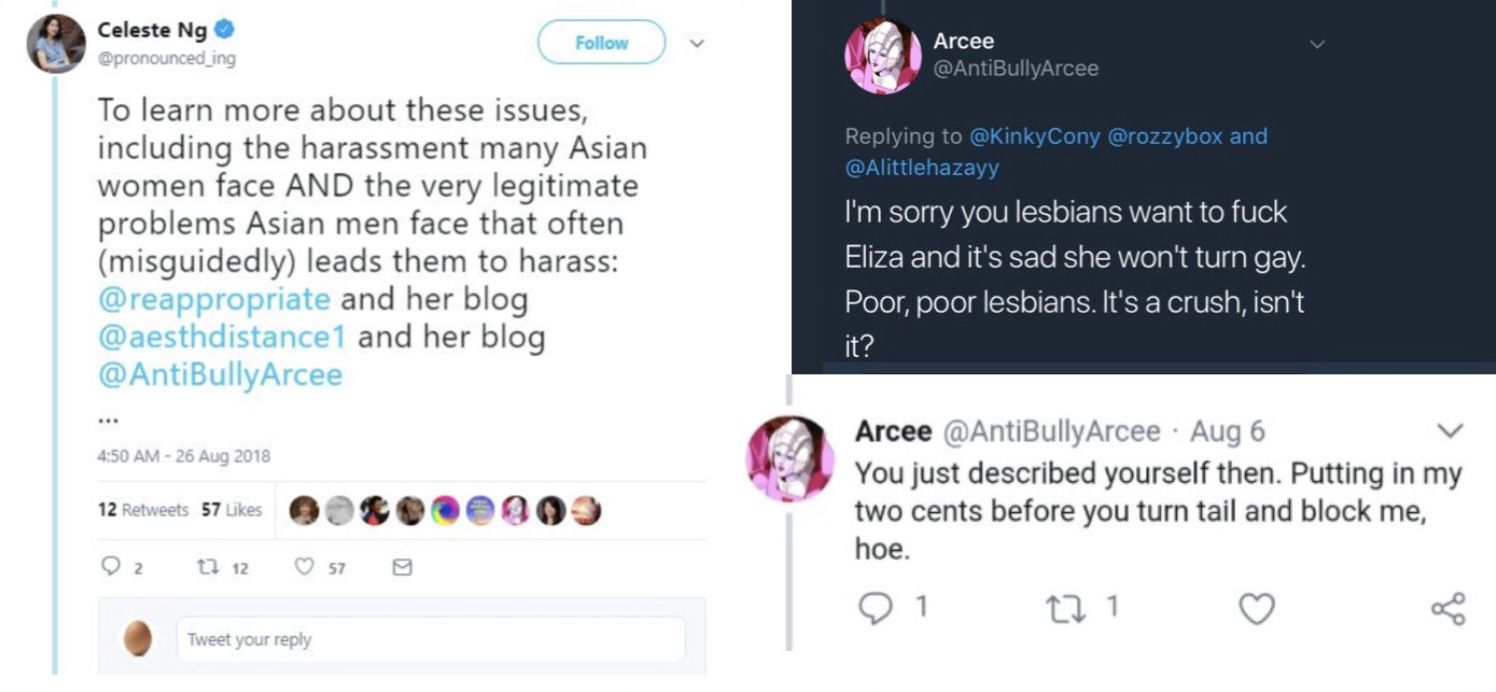
Furthermore, in a move that horrified some of her Asian women allies, she haphazardly expressed solidarity with Esther Ku, a racist comedian who mainly panders to the 4chan white-male Yellow-Fever crowd.
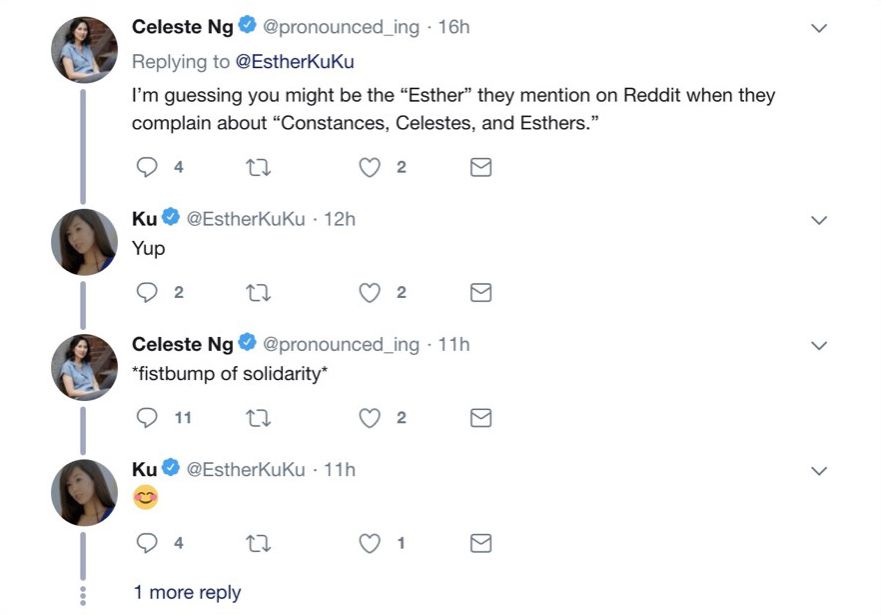
This is not to completely impugn Ng’s judgment, but rather to highlight that there is much more to this issue than initially meets the eye. The danger is that those on the outside will latch onto the simplest or most self-affirming narrative, as conveyed to them by the only/few Asian Americans they’ve let into their circles.
The anger is not really about Celeste Ng. While her tweets weren’t admirable, such statements in a vacuum wouldn’t be so incendiary if there weren’t also a long and ugly history of such sentiments in our community. Most damning is that these sentiments obey the laws of white patriarchal supremacy, the very system that many involved claim to oppose.
The truth is that there has been no shortage of Racist WMAF in the public consciousness (let’s not even start with what we see in our private lives). Just in the last few weeks, there has been controversy over remarks made on an Australian dating show in which two Asian women bluntly told an Asian male contestant that they had a “no Asians” policy because Asian guys remind them of their brothers (the same type of argument that Ng made).
There is a well-documented history of Asian women publicly expressing such racist statements against Asian men:
- Gina Choe on America’s Next Top Model from the 2000s is an infamous example. Tyra Banks, much to her credit, was quick to call her out. But even Queen Tyra’s influence was miniscule as the same thing kept happening in Asian America and the Asian diaspora around the world.
- In 2017, it was revealed that Lily May Mac, she of millions of Instagram followers, had a history of dismissing Asian men in favor of white men.
- That same year in England, Asian women made the show Chinese Burn that took specific racist shots against Asian men.
- In early 2018, Audrea Lim wrote an article for The New York Times that finally acknowledged a phenomenon that had been spoken about for years on the internet: the mutual alignment of interests between white alt-right men and their Asian female partners who either supported or tolerated them.
- Even supposed allies like Chloe Bennet (who was born Chloe Wang but had to change her last name to a white one for career reasons) paired themselves up with known white-male racists like Logan Paul.
- For a more everyday example, this much-circulated Instagram post by Michelle Worth-Kinghorn was yet another instance of virulent white-male-idealization.
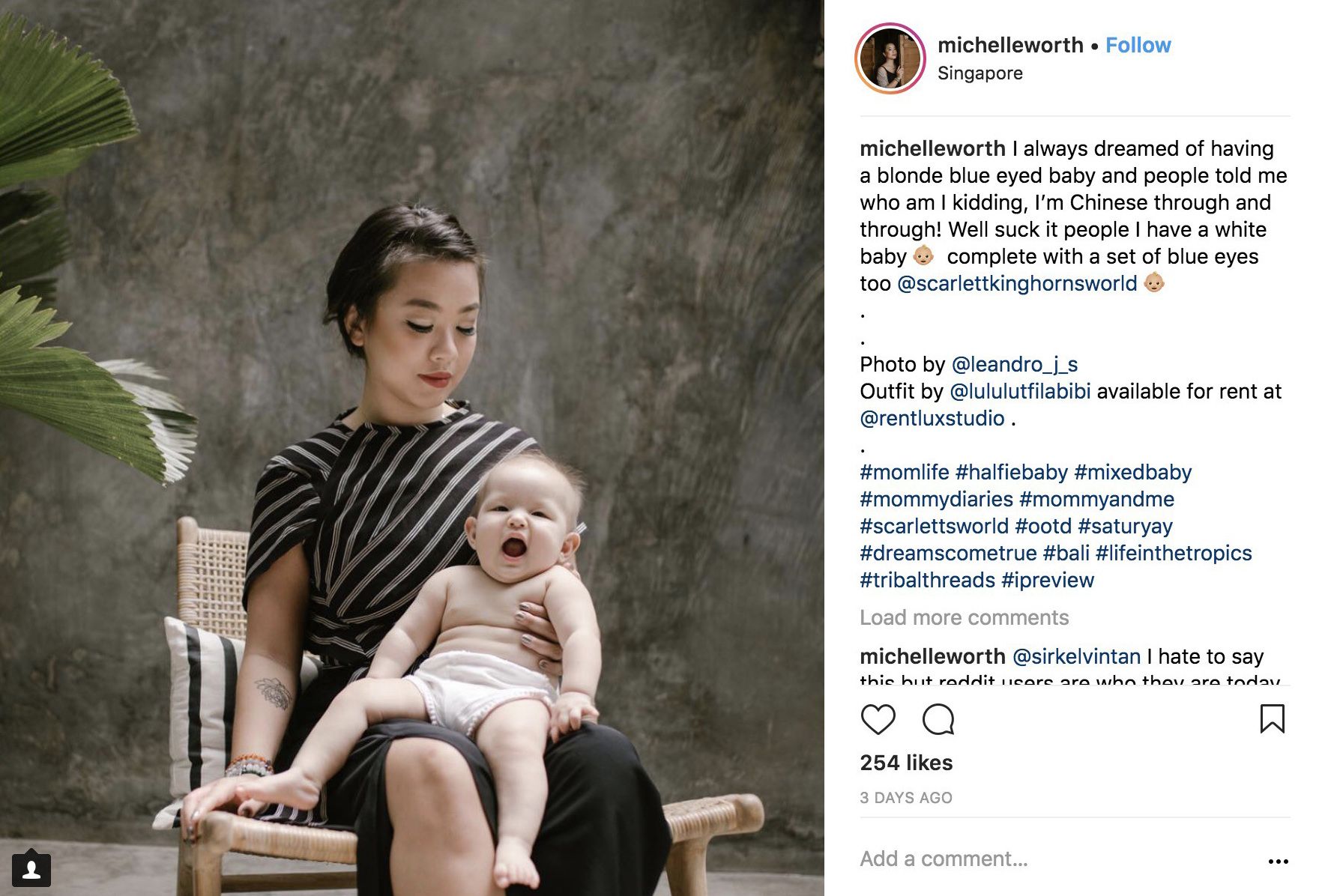
However, even all these incidents pale in comparison to what has been revealed about Julie Chen and Amy Chua in the last few months. Chen not only stood by Les Moonves even after it was revealed he was a #MeToo abuser at the most despicable level, but it was also revealed that she likely was an accomplice to the atrocious treatment of Janet Jackson after her Superbowl “wardrobe malfunction” incident. Chua, also known as the Tiger Mom, has now been exposed as fully complicit in not only aiding Kavanaugh’s ascension to the Supreme Court, but also creating a misogynistic toxic culture at Yale Law that catered to the whims of powerful white men. And we all know about Elaine “I stand behind my man, both of them” Chao.
This is not to assign collective guilt to all Asian women, or Asian women with white men, just because of the actions of a corrupt powerful few. But it is to highlight that many of us in Asian America have known about the problems that lead to the toxic subset of these couplings, both at the elite and everyday levels: this mad assimilationist pursuit of power and status within the fucked-up status quo.
What kind of status quo? It’s one whose main principle is maintenance of and proximity to power. It’s a brand of white liberalism that demands maximum efficiency in its “diversity” that is ultimately geared towards maintaining the power of elite white people. Minority groups, even sub-groups, are pitted against each other to seek inclusion by advertising how bang-for-the-buck we can be at a per-capita level. Such bidding is necessary because slots are limited. It’s the Ivy League-ification of society at all levels. It’s no wonder that in such a system, gender wars between the men and women in a POC community are inevitable.
Media representation advocacy can get overblown, but its importance lies in the fact pop culture representation is often the only way to definitely point to everyday social inequalities that can’t be verified otherwise. Look at how many South Asian women became angry at South Asian men for glorifying white women in works such as Master of None and The Big Sick. Before that, South Asian men were angry at South Asian women for glorifying white men in Bend It Like Beckham and The Mindy Project. Black women’s anger at black men for their white-woman idealization is well-documented and lately, black men have started to resent black women for doing similar things with respect to white men.
In short, this issue isn’t some weird quirk endemic to Asian Americans. This is a feature of the system we all live in. And almost everyone else is able to talk about it, except for us.
The topic of the Racist WMAF has always been suppressed in the Asian American community. We are a young group, with most of our histories in this country beginning after the 1965 immigration reforms. With American-born Asians only making up a minority in our community, the topic of assimilation through interracial relationships (almost exclusively with white partners) does not have an established history since many immigrants came over with Asian partners.
Some try to portray Asian women’s demand for white male partners as a result of Asian male harassment, but this racial requirement existed long before Twitter, Reddit, or even the internet as we know it. In the 1990s, Joan Walsh already noted the existence of this social trend in the Bay Area. In the 2000s, Dr. Karen Pyke wrote about how she was intimidated into silence when she suggested that internalized racism was fueling the WMAF imbalance.
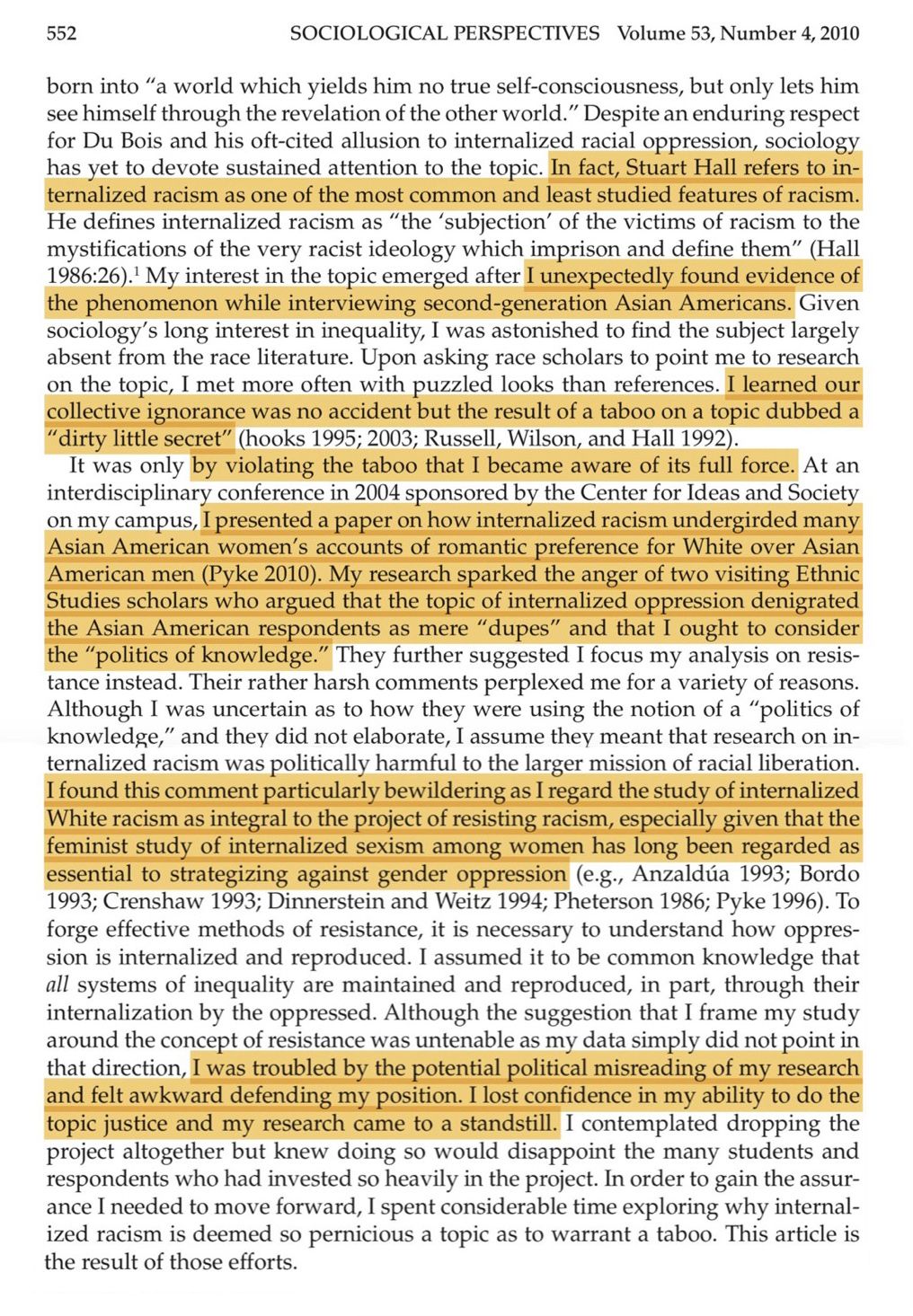
For more recent examples, one can start with what happened to John Cho after he discussed his worries about raising his Asian son in a white-dominant neighborhood because of how differently Asian boys and girls were accepted in such environments. Though one could argue that he should’ve been more precise in what he meant, did it really warrant labelling him a “#hypermasculazn” by an online Asian American activist clique that can best be described as a hallway patrol, tasked to report all discussions about WMAF? The same crowd did the same thing to Jeremy Lin, after he gave a very thoughtful answer on this issue in a press conference.
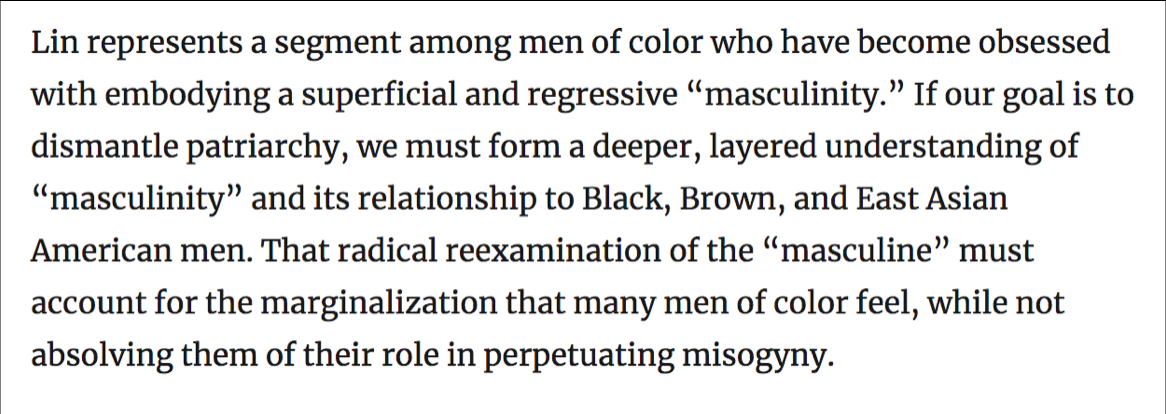
Even though the squeaky-clean Lin put the onus on Asian men to be confident and optimistic, the mere fact that he acknowledged the WMAF issue was enough to put him on a blacklist. And in the last few weeks, the reputable artist Joshua Luna has been singled out as a toxic Asian man because in a rather even-handed comic that also called out Asian men for patriarchal misogyny, he dared to suggest that some Asian women’s requirement for white male partners meant they were complicit in perpetuating white supremacy.
It’s not only Asian men who are targeted, as was evident in what happened to Dr. Pyke. Even Asian women are not spared. Earlier this year, the NPR journalist and podcaster Yowei Shaw posted in r/asiantwox (Reddit’s most popular subreddit for Asian American women) about a story she was working on internalized racism in WMAF relationships (as part of a broader story on racial preferences/requirements in sexuality). Shaw, in a multi-paragraph solicitation, expressed the utmost empathy and understanding in talking about this issue. However, that was not good enough for the aforementioned hallway patrol that consequently waged an online crusade to run Shaw off of Twitter.
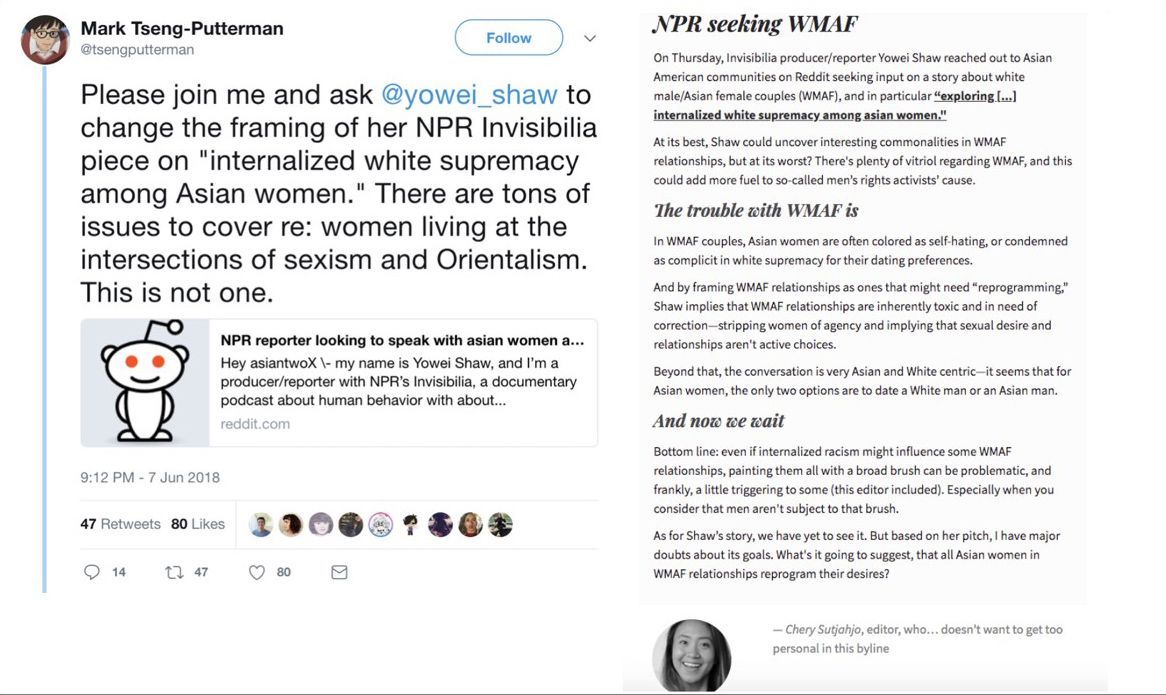
If Asian women from NPR and choirboys like Jeremy Lin are forbidden from even acknowledging this issue, the message is clear: nobody can talk about this at all. Or rather, the only people who can talk about it are those who’ve been given clearance by a group of overseers, on the condition that they don’t compromise the self-image of those in their clique. The danger with this kind of suppression is that it makes unnatural allies between the genuinely scummy (i.e. Asian guys who would’ve been harassers in any environment) and those who simply want an honest discussion about a problem that everyone can see.
It’s not just celebrities that are suppressed. On Reddit, r/asianamerican is ostensibly the go-to space for Asian Americans to talk about all the things they can’t in real life (as well as about boba and movies). But now, any talk of WMAF results in censorship or banning. While they may say they only ban troublemakers and trolls, I and other reasonable posters with good reputations were purged as well.
A lot of the anger is not borne of the inequality, but rather, the hypocrisy. Inequality is often a systemic inevitability that creates understood classes of shared interests, which means even those on the disadvantaged end can find solidarity with each other. But with hypocrisy, even that sense of kinship is denied through gaslighting. It’s one thing for Asian guys to deal with racial discrimination via WMAF, but it’s another to be told that such discrimination is actually progressive.
In addition, if racial preferences are indeed unquestionable, then what would we say to black women or gay men of color who face similar social obstacles as straight Asian men? If the WMAF imbalance is simply a progressive “love is love” outcome, then the same tut-tutting message should be said to black women or gay MOC. Despite all the negative stereotypes against Asian men, we outmarry at a similar rate as black men (though some evidence suggests that a significant number of Asian men are excluded from the marriage/dating market altogether). In fact, the outmarriage rates for most men of color are similar. The same can’t be said for women of color, however. Asian women have markedly high rates while black women have markedly low rates.
So if it is indeed “love is love,” then one would have to conclude that Asian women are simply more naturally attractive than black women, either for physical or cultural reasons. But the hallway patrol doesn’t dare say that. Consequently, their hypocrisy continues to fuel the fire.
So what do Asian men want? Speaking from a personal level, what we want is a fair shot. Most of us younger Asian Americans are all 2nd-generation (i.e. those born in the U.S./Canada/UK/Australia, etc.). We are actually in uncharted territory when it comes to what it means to be Asian in predominantly non-Asian countries. Are Asian couples and families even possible or it all just a rat race to link ourselves with more established groups?
I grew up in a home with domestic violence. I know this is a common experience for a lot of 2nd-generation Asian Americans. I suspect it’s a combination of imported norms from Asia that’s exacerbated by the stress and trauma of immigrating to a country where you become a 2nd-class citizen. I know what it’s like to grow up in difficult situations that lead you to blame a lot of things on your race and culture. I don’t think it’s weak or crazy to be susceptible to that kind of thinking for at least some period in your life as a young Asian American.
But seeing all that only reinforced my determination to not perpetuate those behaviors. Yet before we Asian American men even have a chance to try to establish what a modern Asian American relationship can be, we feel we are being undercut constantly by the women in our own community. And the most galling thing is that while we are being judged harshly, white men — the ones actually perpetrating much of the indignities against our community — get off lightly, or even praised. The hypocrisy is that Asian men are being held accountable for the sins of our fathers while white men are constantly getting passes for the actual sins that they themselves commit. And when Asian American men talk about this injustice, we are labelled as Confucian incels whose very act of complaining justifies the elevation of white men in a convoluted time-paradox straight out of a bad action movie.
Women deserve their social freedom and given the long history (and current efforts, especially in the Trump Era) of men’s attempts to curtail that freedom, women are rightfully zealous in protecting their turf. However, as feminist philosopher Amia Srinivasan says:
Consider the supreme fuckability of ‘hot blonde sluts’ and East Asian women, the comparative unfuckability of black women and Asian men, the fetishisation and fear of black male sexuality, the sexual disgust expressed towards disabled, trans and fat bodies. These too are political facts, which a truly intersectional feminism should demand that we take seriously. But the sex-positive gaze, unmoored from Willis’s call to ambivalence, threatens to neutralise these facts, treating them as pre-political givens. In other words, the sex-positive gaze risks covering not only for misogyny, but for racism, ableism, transphobia, and every other oppressive system that makes its way into the bedroom through the seemingly innocuous mechanism of ‘personal preference’.
— Does Anyone Have The Right To Sex?
In addition to protecting women’s freedoms, should we not be allowed to fight this oppressive system that Srinivasan speaks of as well?
In case it needs repeating, this is not to denigrate all WMAF couples. Considering that there are still plenty of Asian men with white women, it’d be utmost hypocrisy for Asian men to claim that WMAF pairings can never be healthy. They may try some argument that says “AMWF (Asian Male, White Female) subverts the white patriarchy,” but that’s barely more credible than when Asian women say that being with white men is like “colonizing the colonizer.” Both are just attempts to launder white idealization.
But when you mix bad actions, hypocrisy, and suppression, the outcome will always be anger. This is not to justify any harassment against Ng or any other Asian women. Such acts are never acceptable and should always be condemned. But the solution is not to then outlaw all discussion of a legitimate problem, especially when we can already see what the result of that is. Ng advocates for the banning of certain Reddit spaces. Such a move would be, at best, only a temporary solution, if a solution at all. This issue didn’t start with Reddit (or any other online space) and it’s not going to end there either. Those who want genuine solutions need to have better imaginations.
Anyone with eyes and ears can clearly see that there’s a racially derived social caste system in America, even in supposedly egalitarian liberal America. There are legitimate questions to be asked about why it seems that almost every influential Asian American woman is with a white man. The message being that if you’re an Asian woman and you want to ever go to the Met Gala, you’ll never get there with an Asian man by your side. Many defensive Asian women say that most Asian American women are with Asian men. If that’s the case, then is there not a gross imbalance in overrepresentation of the WMAF perspective? Never mind erasing Asian men; what about the voices of Asian women with Asian partners?
For Asian men, not even being allowed to acknowledge this system may be creating dangerous sympathies between the reasonable and the extreme. The cynic in me wonders if this is the desired outcome for the hallway patrol, to force even mild dissenters into extremism in hopes of discrediting them forever. However, despite what one may see on Twitter, I doubt this is the majority of Asian Americans. I think most do want to have a conversation. But we can’t have a conversation if even the mere mention of this topic brands you as a toxic and backwards presence.
If open and thoughtful discussion is allowed, the tensions will diffuse. Only by honest talk can we minimize the hypocrisy in which acquiescence to prejudiced dominant norms is passed off as progressive. Then trust can be established and we can finally chart this unexplored territory together.
Follow Chris on Twitter: @JesuInToast

Comments powered by Talkyard.